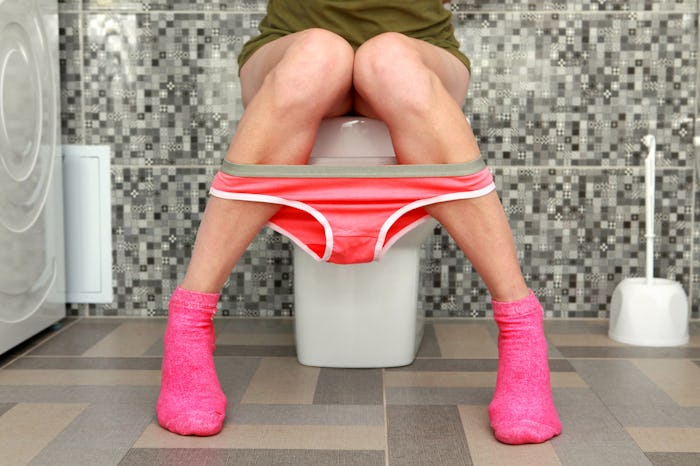Life

Does Giving Birth Make You Pee During Sex?
It's no secret that sex is different after having a baby. If it wasn't, medical providers wouldn't tell you to wait and heal a little bit. Most women who've been pregnant before will tell you that growing a human stretches your muscles to the max. Additionally, going through child birth causes these muscles to stretch again. Aren't bodies amazing? Unfortunately, the result of all of this "amazing" stretching might be a new, hard-to-control bladder. One which fills up fast and even leaks. You may wonder, does giving birth make you pee during sex? As unsexy as that may sound, it's pretty normal and very common in postpartum women.
Frequent urges to pee and accidental golden showers aren't anything to be ashamed of and they don't have to be a mood killer at all. Both can happen during sex and it's not out of the ordinary. According to Dr. Sherry A. Ross, author of She-ology: The Definitive Guide to Women's Intimate Health. Period, your bladder simply needs time to recover after giving birth. "It’s not unusual to have loss of urine with common activities such as laughing, walking, jumping up and down, and jogging.," she tells Romper, noting other women might notice the urge to pee during sex. After all, it's not only the vagina that takes a beating during pregnancy and birth. "The bladder, along with the vagina, is traumatized after a vaginal delivery." She also adds that C-section moms can also experience this bladder trauma, although not as much as moms that give birth vaginally.
It might be embarrassing or uncomfortable, but there are things you can do to strengthen your pelvic floor again. "Right after delivery you can start to do Kegels to improve the pelvic floor muscles that have been weakened with a vaginal delivery," Ross says. Even if you're not noticing leakage or strong urges to pee during sex, you still may need to do Kegels if you're feeling uncomfortable pelvic pressure in general. She says Kegel exercises are a simple and effective way to strengthen the muscles (which also support the uterus, bladder, and bowel). Additionally, Kegels are great because, "they can help delay or even prevent pelvic organ prolapse (protrusion of the pelvic organs into or through the vaginal canal) and loss of bladder control."
If you're not a Kegels kind of gal, or you're like me and literally have no clue if you're ever doing them properly, there are other options. "Each woman's case is different, so there is no one trick for fixing pelvic floor problems," Deena Blumenfeld, lamaze certified childbirth educator of Shining Light Prenatal Education, tells Romper. "When I work with women who have pelvic floor dysfunction, I work in conjunction with their physical therapists to get them back on track." Blumenfeld recommends getting a referral for a physical therapist who specializes in women's pelvic floor health. If you want to try something on your own, you can try some pelvic floor breath awareness exercises (Blumenfeld has a great instructional video on YouTube) to help you with this one.
As a mom who's given birth twice I followed along with her video instructions and thought they were great. Additionally, she says you can try seeking out specialized yoga instruction, massage, and sometimes, even chiropractic services to help.
As far as, how long will it take your bladder to fully recover? It varies woman to woman. "It may take up to one year for your bladder to function normally," Ross says. "I would not lie to you and say it will return to normal because it may never do so." Heck, I'm five years postpartum and I feel like things in the bladder department will never be the same. Jumping jacks are basically a no-go for me at this point, but I've accepted it and moved on.
Having to pee frequently during sex might be embarrassing and even really annoying, but it's important to remember that it's OK. Your human body needs time to heal if it's just gone through pregnancy and child birth. Assuming you are open with your partner (and they are understanding), frequent urination is nothing to be ashamed about and can be corrected with a little effort, and simply time.